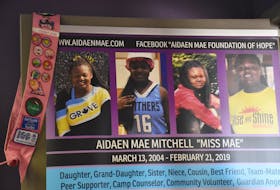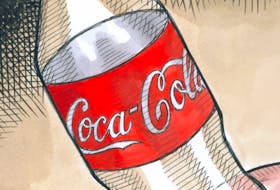"At night the heavens are starry and black, up here on top of the world, across the sky northern lights dance, reds and greens a-twirl.
The Inuits say don't whistle, when the northern lights are high, lest they swoop to earth and carry you up to the luminescent sky."
These lines are taken from the poem "Labrador in Winter" by poet Kate Tuthill, the full text of which can be found on her website www.katetuthill.com.
The idea in the poem that you can whistle down the Northern Lights is a belief held by many people across the north.
There is some debate, however, about whether or not whistling down the lights is a good idea.
Some say that if you whistle at the Northern Lights, they will dance for you. The more cautious argue that one should never whistle when the Northern Lights are low, as it can bring great misfortune, even death.

One story from Hay River, Northwest Territories, tells of five hunters who died because the bells on their dog harnesses caused the Northern Lights to come close to Earth. The hunters saw the lights descending, but even though they lay flat in the snow beside the sleds, they inhaled some part of the aurora and all perished.
Another mystery of the Northern Lights is the sound that they are said to make. The noise generated by the Aurora Borealis has been reported in legend, folklore and in modern times. The phenomenon is a mystery to scientists, as the thin air of the ionosphere where the lights are generated cannot carry sound waves.
In 1995, science writer Ned Rozell, of the University of Alaska Geophysical Institute, wrote an article entitled "Straining to Hear the Voice of the Aurora." Rozel interviewed Tom Hallinan, a professor of geophysics at the Institute. Hallinan had studied the aurora for decades and claimed to have heard it himself.
"There's something going on," Hallinan was quoted as saying. "It's scientifically unreasonable, yet people do hear it."
One theory is that the brain may sense electromagnetic waves from the aurora and through some unknown process, convert them to sound. A different theory holds the aurora creates electrical currents on the ground, which might create an electrical discharge from nearby objects such as trees or buildings which the human ear can then hear.
A Canadian anthropologist, Ernest Hawkes, published an account in 1916 which gave a more traditional explanation. According to his research at the beginning of the 1900s, the Labrador Inuit believed the aurora to be the torches of spirits illuminating a pathway to heaven for souls of people who died a voluntary or violent death. Hawkes related an Inuit belief that the spirits could be seen in the aurora kicking around the skull of a walrus in a game similar to soccer.
"The whistling crackling noise which sometimes accompanies the aurora is the voices of these spirits trying to communicate with the people of the earth," Hawkes added. "They should always be answered in a whispering voice."
Danish explorer Knud Rasmussen wrote something similar about a Greenland Inuit belief in this celestial soccer match, in 1932
"It is this ball game of the departed souls that appears as the aurora borealis, and is heard as a whistling, rustling, crackling sound. The noise is made by the souls as they run across the frost-hardened snow of the heavens. If one happens to be out alone at night when the aurora borealis is visible, and hears this whistling sound, one has only to whistle in return and the light will come nearer, out of curiosity."
I myself am curious about this phenomenon. I have seen the Northern Lights, but have never heard the sound associated with them. If you have, or have a story about this northern mystery, give me a whistle at [email protected].
Dale Jarvis can be reached at [email protected]

![['It’s cold, it’s dark, but it’s beautiful – Josh Bingle captures the northern lights outside Labrador West.']](https://saltwire.imgix.net/aur-a00-28032016-josh_bingle-td2_webcc.jpg?cs=srgb&fit=crop&h=568&w=847&dpr=1&auto=format%2Ccompress%2Cenhance)







